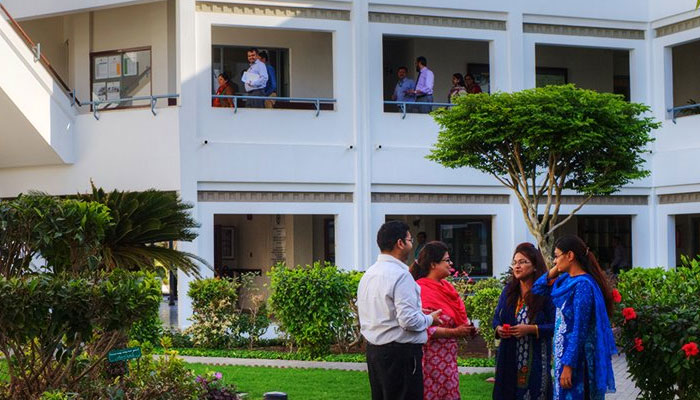Educators stress need for teaching licence in Pakistan
A teaching licence can help certify that a teacher has the skills and knowledge needed for effective classroom practice, stressed participants at a policy dialogue organised by the Aga Khan University Institute for Educational Development.
The dialogue aimed to raise awareness, gather evidence and make technical recommendations on the possibility of introducing a teaching license in Pakistan, said a statement issued on Wednesday.
Such a certification can serve to enhance teaching quality and, subsequently, students’ learning. A teaching licence can also raise the professional status of teachers and open new employment opportunities for them locally as well as abroad.
One of the keynote speakers, Dr Linda Darling-Hammond, professor emeritus of education at Stanford University, drew upon the history of the medical profession to highlight the long struggle that it underwent before it arrived at its current state. Likewise, she felt that teacher education would undergo the same struggle. “Licensure will benefit teachers as well as teacher education institutions to improve quality.”
“Teacher licensing is desirable in Pakistan to improve teaching standards. However, we need to be mindful of the political economy of teaching licenses,” said Dr Irfan Muzaffar, technical director at Khyber Pakhtunkhwa Education Support Programme, the other keynote speaker at the dialogue. “The schools of education at universities need to make concerted effort in this regard.”
The dismal learning outcomes of Pakistani students are visible in the assessments conducted by many local and global agencies. The government’s NEAS, National Education Assessment System, the citizen-led ASER Annual Status of Education Report and the international TIMSS, Trends in International Mathematics and Science Study show how weak students’ learning outcomes really are in Pakistan. Experts said students would benefit more from better teachers who had undergone relevant and credible professional development.
“A good teacher is like a good doctor,” said Dr Sajid Ali, an associate professor and director of research and publications at IED. “A bad doctor despite having access to a well-equipped clinic and medicines cannot treat a patient adequately. Similarly, a bad teacher despite having an excellent curriculum or assessment system cannot transform students into successful learners.”
Deliberations at the event led to participants recommending the introduction of teaching licences, which can enhance the government’s efforts to improve the standards of teaching and overall teacher management system. They also touched upon various technical, political and economic questions that need to be resolved as efforts progress towards a licensing policy.
The dialogue team aims to produce a white paper on teacher licensing – from the proceedings – that will contain the literature review, the outcomes of dialogue, findings of survey and policy recommendations for introducing teaching license in Pakistan. It will also contain the key pressure points and their possible resolution. The white paper will be useful for legislators to move forward towards teaching license policy.
The white paper will also serve as a resource for a continuing dialogue amongst educationists, policy makers, educational managers, legislators, parents, schools, teachers and other stakeholders from across Pakistan to assess its feasibility in Pakistan.
In the past, various efforts have been made to introduce teacher licensing under the banner of various education development projects. This White Paper effort is spearheaded by AKU-IED without any project support and is based on a systematic process that includes a thorough situation analysis, global comparisons and national consultations. The dialogue was preceded by a series of seminars with international speakers and will continue post-event to determine the feasibility and next steps for teacher licensing in Pakistan.
-
 Prince Harry And Meghan Unlikely To Meet Royals In Jordan
Prince Harry And Meghan Unlikely To Meet Royals In Jordan -
 Hero Fiennes Tiffin Shares Life-changing Advice He Received From Henry Cavill
Hero Fiennes Tiffin Shares Life-changing Advice He Received From Henry Cavill -
 Savannah Guthrie's Fans Receive Disappointing News
Savannah Guthrie's Fans Receive Disappointing News -
 Prince William Steps Out For First Solo Outing After Andrew's Arrest
Prince William Steps Out For First Solo Outing After Andrew's Arrest -
 Jake Paul Chooses Silence As Van Damme Once Again Challenges Him To Fight
Jake Paul Chooses Silence As Van Damme Once Again Challenges Him To Fight -
 Google Disrupts Chinese-linked Hacking Groups Behind Global Cyber Attacks
Google Disrupts Chinese-linked Hacking Groups Behind Global Cyber Attacks -
 Four People Killed In Stabbing Rampage At Washington Home
Four People Killed In Stabbing Rampage At Washington Home -
 Meghan Pushes Prince Harry Into Territory That’s Dangerous To His Brand: ‘She Isn’t Hearing A Word Of It’
Meghan Pushes Prince Harry Into Territory That’s Dangerous To His Brand: ‘She Isn’t Hearing A Word Of It’ -
 Christina Applegate Reflects On Lasting Impact Of Being Molested In Childhood
Christina Applegate Reflects On Lasting Impact Of Being Molested In Childhood -
 Martin Short Makes Big Decision Following Tragic Death Of Daughter
Martin Short Makes Big Decision Following Tragic Death Of Daughter -
 Antarctica’s Mysterious ‘gravity Hole’: What’s Behind The Evolution Of Earth’s Deep Interior?
Antarctica’s Mysterious ‘gravity Hole’: What’s Behind The Evolution Of Earth’s Deep Interior? -
 Hilary Duff Addresses Ashley Tisdale's 'toxic Mom Group' Claims And Matthew Koma's Firey Response
Hilary Duff Addresses Ashley Tisdale's 'toxic Mom Group' Claims And Matthew Koma's Firey Response -
 Jack Hughes's Proximity To Trump Angers Tate McRae Fans
Jack Hughes's Proximity To Trump Angers Tate McRae Fans -
 Neve Campbell Opens Up About Her 'difficult Decision' To Not Sign 'Scream 6'
Neve Campbell Opens Up About Her 'difficult Decision' To Not Sign 'Scream 6' -
 Nobel-winning Scientist Resigns From Columbia University After Epstein Links Revealed
Nobel-winning Scientist Resigns From Columbia University After Epstein Links Revealed -
 Prince William Remarks At BAFTAs 'indicative' Of King Charles Physical, Mental Health Too
Prince William Remarks At BAFTAs 'indicative' Of King Charles Physical, Mental Health Too




